Author’s Note: I don’t as a general rule do SPOILERS. In this case, I’m going in with the film’s biggest so-called secrets laid bare, because I have much to say about them that needs saying…
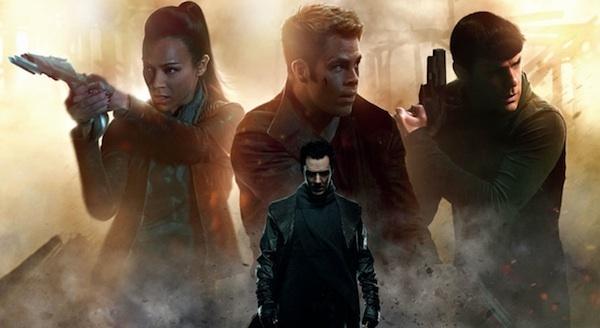
“Star Trek Into Darkness” sure tries real hard to be all things to everyone.
It wants to entertain the mainstream crowd, which is mandatory of course. Yet it also wants very much to be loved by the fans. So this plays like a greatest hits compilation of a particular “Trek” milestone, with familiar character beats and story ideas re-presented in a shiny, hyperactive new packaging. The irony is that by pandering to the fans, the film is bogged down with a whole lot of stupid crap that it simply could’ve done without. In spite of the flaws incurred (mostly) during conception, director JJ Abrams has managed to deliver something highly watchable.
Now you may or may not already know the spoilers, but if I’m to provide any opinion of worth I have to get into them here. The single biggest — and worst-kept — secret is the resurrection of the villain Khan from the 1982 classic “Star Trek II: The Wrath Of Khan”. How come this is a big deal? Well, “Wrath” is widely considered one of the best, if not THE best “Trek” film of all. It was essentially a space-set take on “Moby Dick”, about a man ultimately undone by his obsessive need for vengeance. More than that, the film was an affecting meditation on the passage of time and its accompanying sense of loss and regret. Khan represented a mistake from Captain James T. Kirk’s past that he ended up paying for at great personal cost. As baddies go in “Trek” lore, Khan is unmatched in the eyes of most fans (I prefer the Borg myself).
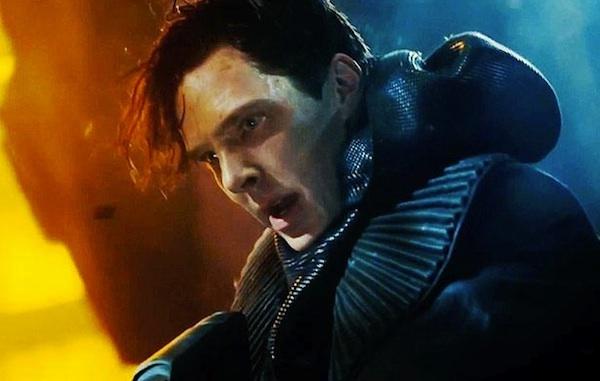
Back in 2009, Abrams set out to reinvent a franchise that had pretty much dried up creatively. He succeeded. “Star Trek” was not only made cool again, the version he created was its own thing. The whole alternate timeline conceit honoured existing canon while allowing him to strike out in any new direction. To boldly go where no one has gone before. And yet, just one film later the filmmakers have chosen to cover such well-worn territory. The question is, why do it?
The Khan of this film is nothing like the original one. For starters, his name Khan Noonien Singh means he is of Indian descent. Original actor Ricardo Montalban was about as Indian as I am Russian. But at the very least they slapped a fake tan on him. So he looked kinda, sorta, err… exotic. This Khan is played by Englishman Benedict Cumberbatch, who is as whitebread as they come. Even the character’s motivations and relationship to the central protagonists are different from anything in “Wrath” or “Space Seed” (the 60s TV show episode where he first appeared). While this Khan is also driven by revenge, it’s got nothing to do with Kirk. Ultimately, to fans this is Khan in name only.
Then perhaps the point is to do a new version of Khan for a new generation of viewers. To make him iconic again. There is enough pop culture osmosis going on out there that most people would’ve at least heard the name and know it’s supposed to be a big deal. Unfortunately, the way the character is handled here, people would be forgiven for wondering what the fuss is all about. This version simply doesn’t make for a very interesting or memorable villain. He even comes off slightly derivative of other villains, thanks to yet another use of that in-trend thing where “bad guy lets himself get caught so he can face the good guys, only to reveal his true intentions”. In a short span of five years, we’ve seen it done in The Dark Knight, The Avengers and Skyfall. Will someone please send Hollywood a memo to tell them that schtick is old already?
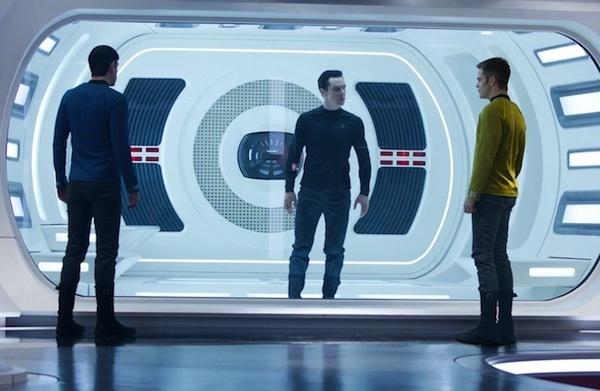
While casting Cumberbatch may have seemed like a good move to many, it’s turned out to be a non-event. He glowers and over-enunciates, but surprisingly for a stage-trained actor, he lacks the larger-than-life theatricality the role requires. That, and charm, which all the antagonists in the films I mentioned had in spades. At the end of the day, to newbies Khan is just another bad guy with a vaguely familiar name. The use of the character has serviced neither Trekkers nor Joe Public, and this just proves there was never any merit in bringing him back at all.
If I’ve spent a lot of time dissing the new version of Khan, it’s because this is really about taking the writers to task. Frankly, I don’t think Roberto Orci, Alex Kurtzman and Damon Lindelof have ever brought anything worthy to the modern blockbuster landscape. There’s a certain cynical, dumbed-down and sloppy approach that pervades their body of work, from the “Transformers” flicks to “Prometheus” to this. They take simple, great ideas established by others, and somehow manage to make them more complicated yet more shallow at the same time.
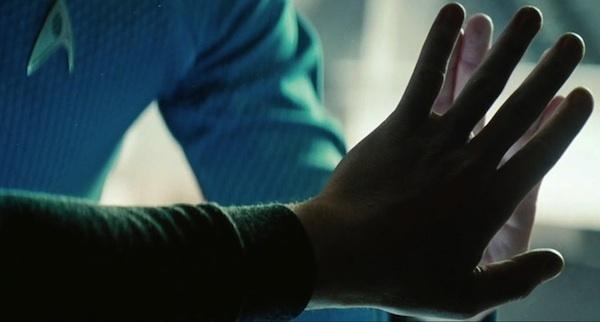
I will give them credit for one smart idea though. In “Wrath”, Spock sacrifices his life to save the crew of the Enterprise. His last words to Kirk is a poignant moment that marks the end of decades of friendship. They do almost the exact same thing here, right down to the dialogue and the framing of the shots, except the roles are reversed. While this scene has no doubt outraged many as being an unearned rip-off, I see it differently. In this alternate timeline, Kirk and Spock aren’t the best of friends yet. They don’t even like each other very much. Kirk is still immature and selfish, while Spock still doesn’t understand the value of friendship. By the end of the film however, both men have learnt valuable lessons. The sacrifice here isn’t meant to mark the end of a friendship, it’s to mark the beginning of one. I may actually be assigning more thought and meaning to this than the writers ever did, but I’d like to believe that in this one instance they weren’t just exploiting classic moments for easy emotional payoffs.
A-a-a-and just when I’m about to cut these guys some slack, they go and invalidate the impact of the scene by refusing to let the dead character stay dead. Understandably, it’s our franchise’s leading man we’re talking about here, so there was never any doubt that he’d make it. Orci, Kurtzman and Lindelof could’ve at least had the good sense to save his return for the sequel, like in “Star Trek III: The Search For Spock”. As it stands, they throw us an overly-convenient solution that feels like a cop-out. I do suspect however, that this decision was made partly in anticipation of a modern-day audience that demands instant gratification. The 2 or 3-year-long wait until the next instalment would likely have proved too much to accept.
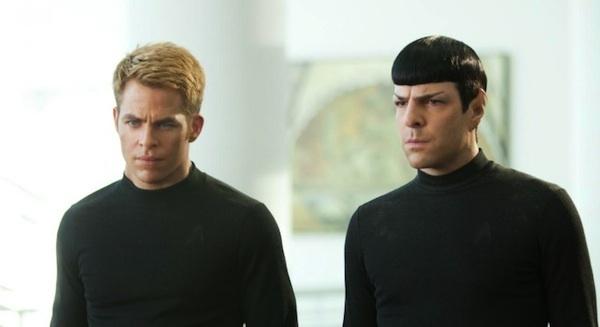
For all the negatives I’ve raised, I can still safely say that the film isn’t ruined. Far from it. That controversial death scene and most of “Into Darkness” works due to Abrams. The guy may not be the strongest visualist (his lens flares have gotten more distracting) or even the best storyteller (he gives in far too easily to his scriptwriters’ worst impulses). But what I’ve always liked about Abrams as a filmmaker is that he imbues his films with the same infectious enthusiasm that he as a lifelong film geek is personally filled with. And that big heart shows up as a form of honesty in the emotions depicted on screen.
Abrams regularly squeezes heartfelt performances out of his cast. In the previous film, he did wonders with Chris Hemsworth in a tiny but crucial role as Kirk’s dad. Here, Chris Pine and Zachary Quinto get the big dramatic scenes and the way that sacrifice scene is acted, directed and scored pulls the heartstrings way more effectively than the way it was probably conceived, on the page. Quinto as the (barely) emotionally-repressed Vulcan is particularly compelling, one over-the-top line delivery aside (which again can be blamed on the script’s need to ride on past glories). I also liked Pine’s quiet scenes with Bruce Greenwood, who plays the fatherly Admiral Pike. Pine’s trajectory as an actor has an interesting mirror in Kirk, and I’ve seen the two mature before my eyes over the course of two films. The playful swagger is still there. Now, he also exudes an assuredness in his performance.
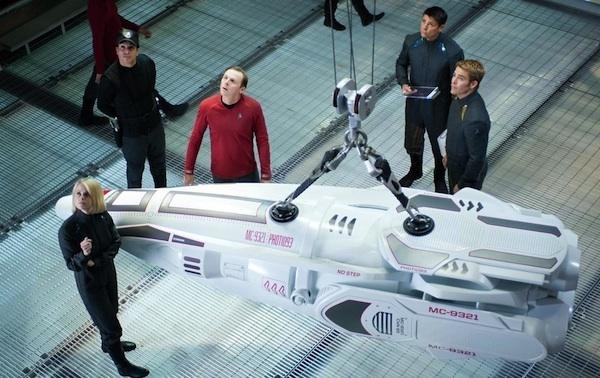
Simon Pegg makes an impression too, though mostly because he’s on comic relief duty. The others don’t fare so well this round, and that’s due to the story not giving them much to do beyond reacting to the plot as it happens to the main characters. It would’ve been nice to see Karl Urban get a meatier part, as the guy’s portrayal of Dr. Leonard ‘Bones’ McCoy is so spot on. Plus Bones has always been an essential part of Trek’s core character dynamic. And I have to give a shout out here to Peter Weller. Never mind his slightly formulaic role, as far as I’m concerned the former “RoboCop” is a welcome addition to any sci-fi movie.
The other thing Abrams is good at is pacing. He knows not to waste time on the things we don’t really need to see, so we can have more time on the fun stuff. And for the most part, “Into Darkness” is a fun ride, filled with solid action sequences and a genuine sense of urgency. If you’re here for spectacle, you’ll get your money’s worth. My only complaint is that he continues to wield his “Star Wars” (original trilogy, not prequel) influences too obviously. Which if you think about it, isn’t a bad thing after all.
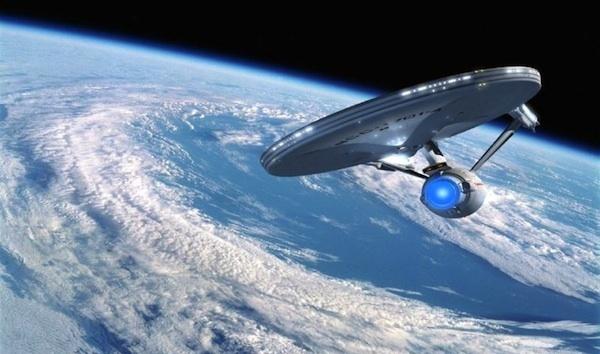
Abrams surrounds himself with quality talent. His ongoing collaboration with composer Michael Giacchino has resulted in some very nice musical themes. Unlike the current trend of atonal scoring, Giacchino is one of the few guys knocking out good old-fashioned melodies you can actually hum. And technically, the film is very polished, with production design, visual effects and sound design up there with Hollywood’s best.
Now, if only Abrams would start picking better scriptwriters to work with, especially for any further adventures with Kirk and gang. This may be a “Star Trek” that has moved quite far away from what it used to be, for better or worse. The one thing the filmmakers should never let go of is the “Trek” spirit of exploring new ground. The universe they’re playing in is so rich with potential that there is absolutely no excuse for lazily retreading in the footsteps of others.
It’s fine to include everyone, fans and newcomers, on the continuing journeys of the starship Enterprise. Just give us something that can be appreciated on its own terms.

I recommended your thoughts thanks for sharing this info
I liked both the movie and Wai's review. Guy really knows his stuff.
Marcellus Wallace: Thanks for the support. :)
Zen & Just saying: If you'd bothered to read my review properly, you'd realise I liked the movie too. Doesn't mean it's devoid of flaws. Thanks for writing!
Buddy, I just don't like your review. That's all. Do for FF6
To quote South Park, I'm not your buddy, guy. And I've got a better idea… why don't YOU do a review of FF6. Unless you don't want to risk being told your review sucks.
What I WILL say about FF6 is that it's a truly retarded movie. It's also one of the year's best action-comedies by far.
Melting…butthurt….trolollololol
JaiZO: Butthurt? Not at all. Thanks for writing!
I like the movie & your review suck ass
amen to that!
I didn't like the movie at all but you trolls are just trollin. Instead of just going oh his review suck ass why not provide some constructive comments. Now I am going to take my own advice and give my own pov. The bad guy could've been named Chong Ah Seng and it wouldn't haf made any diff. Khan is suppose to be smart but his so called genius plan relied more on luck and coincidences. Then the carol wallace blonde was so useless as a character, she didnt do anythin useful and good only for looking pretty. Wth. Worse of all was the stupid idea of khan's miracle blood. When i saw that in the beginning I knew one of the crew will need it to save their life. So predictable man. The reviewer was just giving his points logically and even though I don't agree 100% for example the meaning of the kirk sacrifice, at least he gave it lots of thought. Some people only know how to condemn others but don't know how to be constructive. Sound like govt cronies.
Oh really, why don't you make your own movie. Pathetic.
Typical troll thing to say when they can't think of a valid and mature response. Ever heard of to each his own?